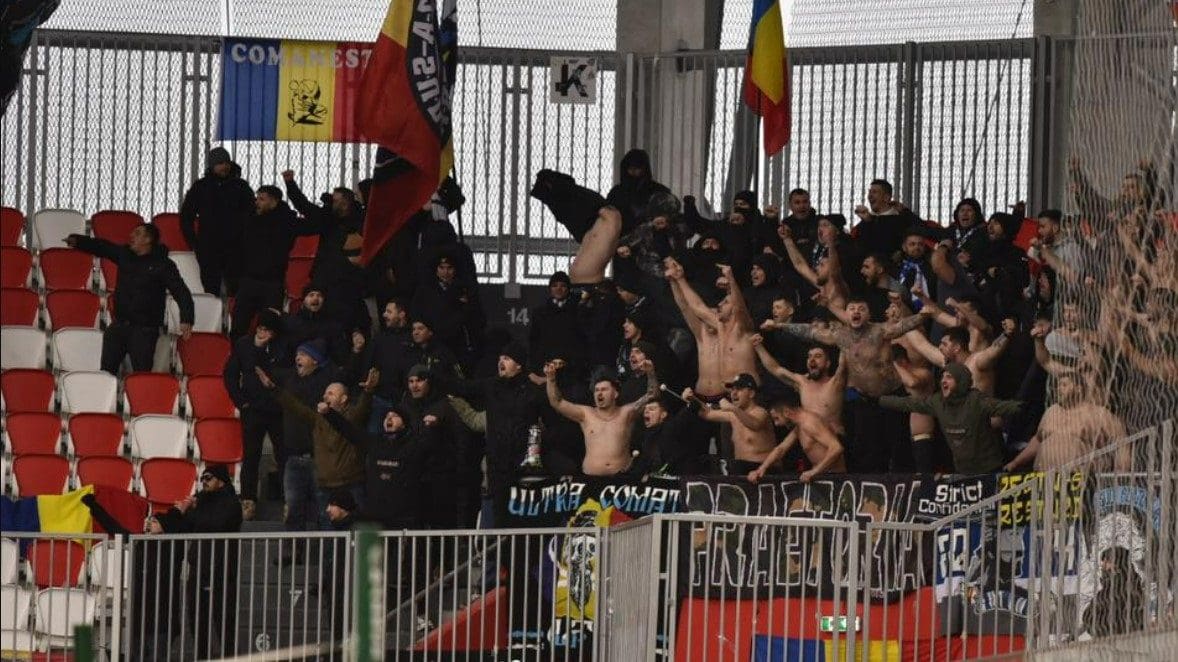The Romanian first division (Superliga) football game between Sepsi OSK and FC U Craiova in Sepsiszentgyörgy (Sfântu Gheorghe) came to a premature end this past weekend. Referee Andrei Florin Chivulete first stopped the game at minute 24 due to the incessant anti-Hungarian chants coming from the away fans. However, even this was not enough to calm the nerves in the stadium, so the Chivulete ordered the teams to go into their dressing rooms. After the impromptu break lasting ten minutes, play resumed—however, only for 20 seconds. Since the vile chants still ensued, Chivulete decided to end the game for good.
Romanian FA President Razvan Burleanu praised the referee for following UEFA’s official three-step protocol when dealing with discriminative behaviour coming from the fans. Former Romanian FIFA referee Marius Avram also commended Chivulete for his decision. This was the first time a football game was called off in Romania due to chants. In 2008, the Bucharest derby between Rapid and Steaua was ended after a fight broke out among the rival fans.
Sepsi OSK President László Diószegi initially told Digi Sport television that he believes this was an act of sabotage on the part of the Craiova fans, who did nothing to actually support their own team for the short duration of the game. The ultras of Craiova have been on bad terms with their own club and its management lately, however, a statement made by the organised supporters’ club for FC U Craiova, called Peluza Sud 1997 suggests that chauvinistic behaviour is endorsed by the football club. Hungarian sports daily Nemzeti Sport quotes the statement as saying that the fans were ‘defending Romanian national integrity’ with their chants. The statement also promises that even more radical actions are coming.
In the meantime, FC U Craiova is deflecting blame. In their official press release about the incident, they insisted that only the host team Sepsi OSK is responsible because the unruly fans were allowed into the stadium in the first place. FC U Craiova general director Marcel Puscas is also quoted in Nemzeti Sport, saying that he believes that calling off the game was unfair to his team, since the Hungarian fans were also shouting anti-Romanian slogans in response, but the referee simply could not understand those.
Despite all this, Sepsi OSK will most likely be awarded the three points for the game, with a 3–0 goal difference.
This is not the first football game a Craiova club played against a Hungarian or ethnic Hungarian team that ended in a major scandal. In August 2019, the other professional club in town, CS Universitatea Craiova, was playing Budapest Honvéd in a Europa League qualifier. The game went to extra time. In the 120th minute, a sound grenade thrown from the home fans exploded near Northern Irish referee Arnold Hunter, who collapsed. After lengthy treatment, he was not able to continue officiating the game and was replaced by the fourth referee. Despite the major infractions by the Romanian fans, the game was allowed to go on, and Universitatea Craiova ended up advancing after a penalty shootout. Most Hungarian football fans felt the match should have been called off and Honvéd should have been given an automatic victory. Instead, while UEFA did punish the Craiova team, they also inexplicably hit Honvéd with a partial stadium ban and a fine.
Football fans in Hungary tend to have a negative view of international football associations and their disciplinary actions. While Sepsi’s case is ongoing, the Hungarian Football Association (MLSZ) is currently in talks with UEFA to remove the historical Greater Hungary map from its list of banned symbols. It has been put on the blacklist after the recommendation of an inspector from the watchdog group FARE (Football Against Racism in Europe). Even Minister of Foreign Affairs Péter Szijjártó commented on the issue at a recent press conference, claiming ‘FARE has no understanding of history’.








